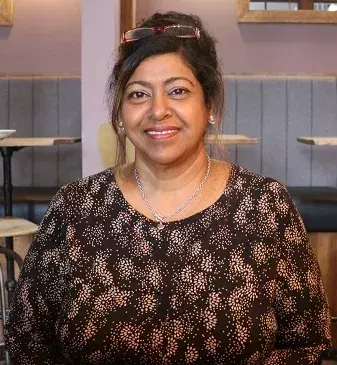Across Northern Ireland 1,345 school Governors are needed to ensure controlled schools are supported to provide high quality education for over 142,000 children and young people.
These volunteers play a crucial role in providing leadership and support to schools. They serve a term of four years.
The Controlled Schools’ Support Council (CSSC) is working with the Education Authority to encourage people from all walks of life to apply to become school Governors.
CSSC sat down with Bhavani Conaghan (pictured) who is a Governor in two controlled schools in Belfast, Strandtown Primary School and Bloomfield Collegiate. She told us what drew her to the roles and what encouragement she would give to people who are considering applying.
Q. What inspired you to apply to become a Governor in a controlled school?
A. I wanted to get more involved in my local community.
I initially joined the PTA of my daughter’s school, Strandtown Primary School and became a treasurer. The last time that Governors were reconstituted, I decided to apply through the Education Authority (EA) to become an EA Governor.
After I was offered a post at Strandtown, EA contacted me and said that were some of my skills that would also be useful in Bloomfield Collegiate and asked if I would be interested in becoming a governor there too. I decided to go for it because I was really interested in the role.
Q. What does your role entail?
A. I attend Board and Committee meetings at both schools. I decided that if I was going to do it, I was going to be fully committed and contribute in any way that I could, so I sit on several Committees at both schools.
In recruitment and selection Committees, I am involved in selection and interviews for posts within the schools. I really enjoy the process of finding the right person for the job who fits well into the school.
Boards of Governors also discuss and agree on policies, the school curriculum and the school development plan, so I am involved with this along with my colleagues.
Since everyone brings a different skill set to the table, it’s great to get different perspectives on these and work together to get the best outcomes for the schools.
Q. What do you find most rewarding about the role?
A. I find being a school Governor very fulfilling. The Principals show real appreciation for the work that we do and they know they can rely on us.
For me, being a school Governor is a way of giving back to the community. I get to see pupils grow and thrive and in part that’s because of the work that we do. I love that I am helping pupils develop to the best of their ability. That’s really satisfying and that’s what makes it worthwhile.
Q. What do you find most challenging about the role?
A. At first I found it a bit daunting because it is a very important role. Principals look to you for guidance and advice. Once I went through the training offered I definitely grew in confidence.
When you realise that everyone has different skills and you work together, this helps to overcome any worries you might have about certain areas. Now I am glad to know the Principals can rely on me.
Q. You said that you engaged in training provided by EA for the role, what training did you do and how did this help?
A. I took all of the training courses that they offered; governance, finance, recruitment and selection and child protection. I wanted to take advantage of everything on offer to make sure I was doing as good a job as possible.
The training was invaluable to me. It helped me to really understand what was required in the role and how to go about it properly. Completing the training meant I was able to fully contribute to both schools.
Q. You are a Governor in a primary school and in a grammar school, what do you think are the differences in your role in each school?
A. The roles are very similar with Board meetings and Committee meetings and preparation for these.
In the grammar school (Bloomfield Collegiate) there is a lot more work that goes into curriculum setting than in Strandtown. You have to take into account the popularity of subjects, the time-table and the school development plan when setting a curriculum.
Q. What advice would you give to someone considering applying to become a Governor?
A. I would say go for it, it is such a rewarding role and you will get so much out of it.
Whatever your background you will have transferable skills that you can bring to the role. In both schools we have people on the Board from all walks of life and each person contributes a different viewpoint. While not everyone may agree all of the time, each person’s opinion is valued and considered.
I would also say that you have to be willing to commit to the role. Take advantage of the training offered and be dedicated to it. With suitable training and commitment, you will finish your four-year term feeling like you have really accomplished something for the school, the pupils and for yourself too.







